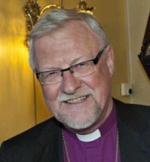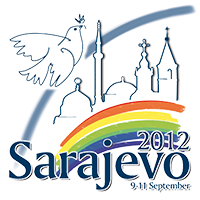
Lutherischer Bischof, Norwegen
|
In 1979 Mother Theresa received the Nobel Peace Prize in my hometown Oslo. She was then asked: "What can we do to promote world peace?" She answered "Go home and love your family."
In this panel our task is to share experience and reflections on “Education for Peace”. I have been asked to do so on the background of what happened in Norway on July 22 last year. Then our society was shattered by the worst act of violence since the Second World War. A blond Norwegian man killed 77 persons and wounded many more. He exploded a bomb in the center of Oslo, killing 8 persons, and two hours later he conducted a massacre at the island of Utøya, killing 69 young people gathered for a Labor Party youth camp.
On that day one year ago we suddenly experienced the new frontiers of peace which today can be found in most countries. It was an attack upon coexistence between people of different cultures and religions. What have we learned, and what is the contribution of Christian faith and tradition to a new formation for peace in our country?
Response to violence
In last year’s Sant’ Egidio Conference in Munich I had the opportunity to share with some of you how people in our country responded to the acts of violence on July 22. Today I want to underline two concerns with regard to “Education for peace”: The first is the significance of expressing togetherness, of celebrating “living together”.
In the midst of our mourning there was a deep sense of a newfound togetherness. All over the country people took to the streets with flowers in their hands and lighting candles in squares and churches. They were young and old, parents and children, and political and religious leaders walked hand in hand in our city centers. It was a massive demonstration that our response should not be hatred, but charity and togetherness. This later spilled over into schools and kindergartens with educational programs, as well to churches and mosques, synagogues and other religious institutions. In the wake of July 22 dialogue groups with young Christians and Muslims have been established as well as dialogue centers and forums.
But I cannot easily pass by the pain and mourning when peace is shattered and so many are killed and wounded. This is my second concern: Where do we go with our wounds and sorrows, our lament and anger? In our country I believe we were somewhat surprised by the multitudes who came to our churches, but also to mosques and other houses of God. To move beyond anger and sorrow, there is a need for a community that will listen and share our pain and lament. Before God and in his presence we may pour out from our hearts the sorrow which is beyond our understanding. It is there that healing processes may start. Sharing the pain and prayer to God was the harbinger of newfound togetherness.
As a Christian two biblical concepts here come to mind as we focus upon formation for peace in our country. Both are relational. The first is remembrance. The other is the sacred image of man.
Remembrance
Memory is intrinsic to our vision of the future and to the way we now act. In Norway many say: Never again the 22. of July! This day will every year be a day of remembrance. The Bible also continually encourages us and the people of God to remember.
We often quote: “Remember that you were slaves in Egypt,” – a reminder of God leading the people into freedom and holding up for them his vision for their freedom, but then also their responsibility for the poor and the oppressed (Deut 5,15; 15). But the Bible also says: “Remember what Amalek did to you along the way when you came out of Egypt. When you were weary and worn out, … he cut off all who were lagging behind; he had no fear of God.” (Deut 25,17-18)
These two quotes point to the realism of biblical remembrance: it does not conceal the presence of evil and evil acts in our lives and in our midst, but its emphasis is upon the compassion of God, his acts for our freedom and our reverence for him and for one another. This double realism is then brought together in the words of Jesus in the Eucharist: “Do this in remembrance of me!”
The cross of Jesus Christ is the compassion and love of God carrying all wounds and injustice, and his resurrection is the beginning of a new future for both victims, perpetrators and communities. It is to this deeper level of remembrance that we as a church have invited our people. But this remembrance has also further implications.
The Sacred Image of Man – and Humanity
Remembering the victims and caring for the wounded is to care for the sacred image of man – every person created in the image of God. Both Jewish, Christian and Muslim tradition teaches that to destroy one man is to destroy a whole world, and that to save one man is like saving all men.
In our Norwegian society with a recent plurality of ethnic, cultural and religious groups we have to some degree been perplexed. It is we who are grown-ups who need to be reminded of the equality of all men, of the sacred image of every human being. In our kindergartens they relate to one another as they are – simply children together. It is when they grow up, enter school and learn from parents and teachers that problems arise. Today this puts a great responsibility upon our parents and teachers, and I am tempted to say: to learn from the small children. To me this gives an added dimension to the words of Jesus: “Unless you change and become like little children, you will never enter the kingdom of heaven.” (Mt 18,3)
In times of crisis the dignity of man is at stake on several levels. It also pertains to perpetrators and those who share their views and hatred, if not always their acts. In Norway the perpetrator received the maximum prison sentence that we have. Being accountable for one’s actions is one significant element in human dignity. This also implies that serving his prison sentence, the perpetrator should be treated with human dignity. But before, during and after the trial we have had a discussion about evil and how to deal with terrorists and those who share their views, and this discussion continues.
The particular Christian contribution to this discussion has not only been to point to the dignity of every human being, but to the words of Jesus calling us to love even our enemies. To build a peaceful society and educate both children and grown-ups for peace, we do need a fair and human judicial system and we need transparent communities with open debate. But open debate is not enough. Rational argument alone seldom overcomes hatred, but love in practice may.
Where should we then start? In the Bible the first expression of hatred and the first act of violence is Cain killing his brother Abel. Enmity and rejection are often first experienced in the family. Over and over again we realize: the basic education for peace starts in our homes and families, for which reason I quoted Mother Theresa: “Go home and love your family.” There is the basic learning ground for what it means to be loved and to love the other, even your enemy. In her Nobel Lecture in 1979 Mother Theresa added: “… a person that is shut out, that feels unwanted, unloved, terrified (and) has been thrown out from society … I find that very difficult."
To some extent this was also the Gospel-like response when people took to our streets and young people said: not hatred, but love, not enmity, but living together. Today, one year later, when we are faced with the difficult task to implement this in our communal life, we have to remind one another:
- Remember the horror and the victims, but also what we said to one another one year ago!
- Remember the outstretched hands and our experience of togetherness.
And we say as Christians:
- Remember Christ, his cross and resurrection for the sake of our healing, restoration and a different future!
- Remember and start celebrating the vision of Jesus and the Bible for our living together in the future: the vision of the new Jerusalem with a great multitude that no-one can count, from every nation, people, tribe and language.
|

